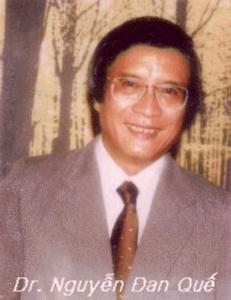
DR. NGUYEN DAN QUE'S
BIOGRAPHICAL HIGHLIGHTS

DR. NGUYEN DAN QUE'S
BIOGRAPHICAL HIGHLIGHTS
1942 Born in Hanoi, Vietnam.
1945 His father, a member of the Vietnamese
Nationalist Party, was assassinated by the Communists.
1954 The family, the mother and five children,
migrated to Saigon after the Geneva Accord.
1966 Dr. Que graduated from Saigon Medical
School and joined the faculty as an assistant professor.
1968-1974 Dr. Que received a scholarship from the United
Nations' World Health Organization (WHO)
for special training in medicine in Belgium (1968),
French (1969), and England (1972).
1974 Dr. Que refused a job offer from WHO to return to
Vietnam to teach at Saigon Medical
School as Assistant Professor of Endocrinology.
1975 Communists took over South Vietnam. Dr. Que was then
Chief of Nuclear Medicine at Cho-Ray Hospital in
Saigon. He had the opportunity to leave the country
but chose to stay to provide medical care to the poor.
1976 Dr. Que was removed from the position of Administrator
of Cho-Ray Hospital after he
criticized the Communist Party's discriminatory health
care policies.
1978 He formed the National Progressive Front. Published
two underground newspapers,
The Uprising (Vung Day) for the youth and The People's
Uprising (Toan Dan Vung Day)
for the people of Vietnam, to question the
government's violations of basic human rights
and to ask the government to reduce military spending to invest
in social welfare and health care for the people .
1978-1988 Dr. Que and 47 associates were arrested and imprisoned
without trial; they were tortured and five died in
captivity. When Dr. Que demanded improvement in the
treatment of political prisoners, he was incarcerated
in a five-by-six foot cell without sanitary facilities
for two months.
1988 After his release, Dr. Que became the first Vietnamese
member of Amnesty International.
1990 Dr. Que formed the Non-Violent Movement for Human
Rights (Cao Trao Nhan Ban).
On May 11, 1990, Dr. Que issued the Manifesto urging
the communist regime to respect human rights, to accept political
pluralism and free and fair elections.
Dr. Que was re-arrested, imprisoned and held incommunicado.
1991 Under intense international protest and
pressure, Hanoi brought Dr. Que to a half-hour
sham trial in November and sentenced him to 20 years
of hard labor followed by 5 years under house arrest
for "trying to overthrow the government".
1993 Dr. Que was transferred from one prison to another.
Currently he is in a prison camp in the rural area
Xuan Loc, about 50 miles northeast of Saigon. Despite
poor health, he was forced to perform hard labor and
kept in solitary confinement.
1994 Still a prisoner of conscience.
Dr. Que has been adopted as a "Prisoner of Conscience" by
Amnesty International. His unrelenting non-violent struggle for human
rights, freedom and democracy for the people of Vietnam gained him
national reputation as a "Si Phu", a Vietnamese tribute to an
intellectual who heroically dedicates his life to the welfare of the
people and the country. US Senator J. Robert Kerrey likened Dr. Que to
Vaclav Havel and the President of AFL-CIO, Mr. Lane Kirkland, has
compared Dr. Que to Andrei Sakharov, Lech Walesa and Nelson Mandela.
Dr. Que has been nominated for the Nobel Peace Prize in 1992, 1993 and
1994. He was nominated for the Robert F. Kennedy Human Rights Award
on June 6 by the Physicians For Human Rights. On June 12, Dr. Que was
awarded, in absentia, the Raoul Wallenberg Award from the US
Congressional Human Rights Foundation.
 Back to main
page
Back to main
page